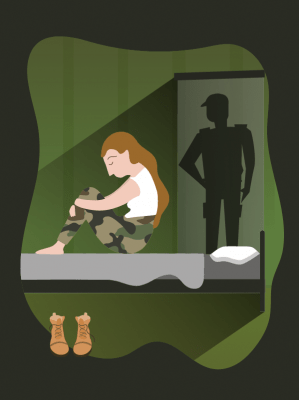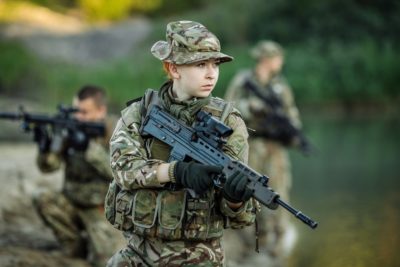Sexual assault continues to plague women in the military

ForcesWatch raises awareness about the physical, mental and moral risks faced by military personnel, so we are pleased to share the Lost Heroines campaign by specialist lawyers Bolt Burdon Kemp. The campaign effectively highlights some of the issues facing women in the military – with a particular focus on sexual harassment. See our blog on the recent Liberty report that slammed serious problems with sexual harassment in the military and showed how women in the forces continue to be let down by a second-rate justice system.
Bolt Burdon Kemp’s new campaign sheds light on this still pervasive problem in the British Armed Forces. Namely, that ‘servicewomen are significantly more likely than servicemen to experience all three forms of sexual harassment investigated [within the Armed Forces]: generalised sexualised behaviours, targeted sexualised behaviours and particularly aggravated behaviours such as sexual assault.’
There’s still work to be done
As the military’s own records state, the percentage of female military personnel who said they had ‘an experience involving targeted sexualised behaviours that made them feel particularly upset’ increased from 13% in 2015 to 15% in 2018. It’s disheartening to see the numbers regress rather than improve.
The Army’s Sexual Harassment Report for 2018 admits that harassment in the military is still being underreported. Less than half (46%) of service personnel who had an upsetting experience told someone at work about it. Unfortunately, three-quarters (75%) of people who made a formal complaint said they suffered negative consequences as a result.
Nine in 10 service personnel said they had thought of leaving the Army, had lost respect for the people involved or felt humiliated due to the experience. As the report attested, service personnel want more education on unacceptable behaviour to help reduce and prevent the rate of sexual harassment in the military.
Nine in 10 service personnel said they had thought of leaving the Army, had lost respect for the people involved or felt humiliated due to the experience.
When sexual harassment hits the military
Every person who joins the military is subject to – and beholden to – the rigours and responsibilities of the job. It is undoubtedly a physically and mentally demanding workplace. See our recent piece on military training here. Unfortunately, for women in the Armed Forces, this already-tough experience is made even more challenging due to the threat (or worse) of sexual harassment.
Rebecca Crookshank’s story makes this painfully clear. During her time in the Royal Air Force (RAF), she experienced first-hand a darker side to the military. Joining the RAF at age 17, her dreams were to experience life outside her small town and emulate her Royal Marine father and grandfather. Unfortunately, her status as a young woman meant her experience quickly turned sour. When she was sent to the Falkland Islands for a four-month detachment, she was greeted by ‘a line of blokes mooning me on the heliport’.
‘That set the tone, really,’ she explains, adding ‘I was subjected to insistent and relentless harassment, much of it fuelled by the free-flowing alcohol. At one point, I was cable-tied to a bed.’ And, when she complained to her superiors, they insisted on having a meeting in her bedroom. ‘My private space; the only space that was just for me and felt safe,’ says Crookshank.
When she complained to her superiors, they insisted on having a meeting in her bedroom.
She was told to ‘suck it up and stick it out’ – and offered a flight on the Tornado F3 instead. The incident would be a contributing factor to her eventually leaving the Force. Regrettably, the RAF has offered no further comment on her case to date.
With the MOD opening all military roles to women in October of last year, it’s more important than ever to acknowledge that the military still has endemic problems with sexism, sexual harassment and abuse. One thing the military must do as a matter of urgency is to recognise rape as a ‘very serious offence’ so that it must be investigated and prosecuted in civilian courts, and also extend this to other serious sexual offences and serious physical violence. Awareness raising like Bolt Burdon Kemp’s the Lost Heroines campaign is also vital; particularly since the military’s own recruitment campaigns and materials whitewash over these issues while at the same time targeting those will be the most vulnerable.
See more: equality, risks, bullying and assault, gender
Like what you read?
> Sign up for our newsletter or blog notifications
> Support our work – from just £2 a month










